PSY 442: Final Project
VerifiedAdded on 2019/09/16
|6
|1696
|351
Project
AI Summary
This document outlines the final project for PSY 442: Community Psychology. The project requires students to create a professional blueprint detailing their career goals within the field. The blueprint includes sections on professional goals, an overview of community psychology, its application to real-world issues, a vision for its future, key concepts, stakeholder perceptions, a systems view, the student's role within the system, and a topic of personal interest. The project is divided into three milestones: Milestone One (Goals, Overview, and Application), Milestone Two (Concepts in Community Psychology), and the final submission of the complete blueprint. A detailed rubric is provided to assess the final product, covering elements like formatting, content completeness, analysis depth, and articulation of ideas. The final project is approximately 16 pages long and requires APA citations.
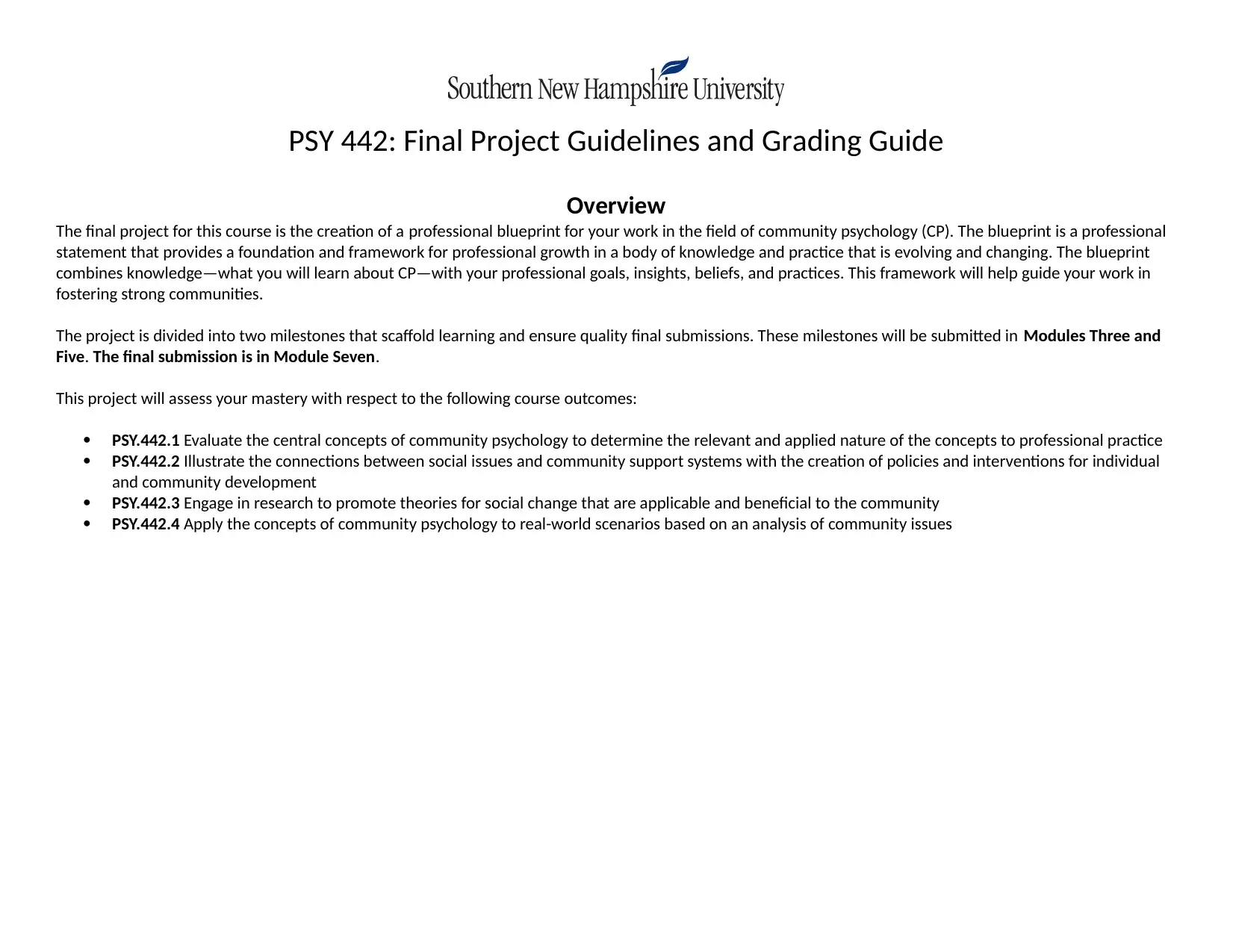
PSY 442: Final Project Guidelines and Grading Guide
Overview
The final project for this course is the creation of a professional blueprint for your work in the field of community psychology (CP). The blueprint is a professional
statement that provides a foundation and framework for professional growth in a body of knowledge and practice that is evolving and changing. The blueprint
combines knowledge—what you will learn about CP—with your professional goals, insights, beliefs, and practices. This framework will help guide your work in
fostering strong communities.
The project is divided into two milestones that scaffold learning and ensure quality final submissions. These milestones will be submitted in Modules Three and
Five. The final submission is in Module Seven.
This project will assess your mastery with respect to the following course outcomes:
PSY.442.1 Evaluate the central concepts of community psychology to determine the relevant and applied nature of the concepts to professional practice
PSY.442.2 Illustrate the connections between social issues and community support systems with the creation of policies and interventions for individual
and community development
PSY.442.3 Engage in research to promote theories for social change that are applicable and beneficial to the community
PSY.442.4 Apply the concepts of community psychology to real-world scenarios based on an analysis of community issues
Overview
The final project for this course is the creation of a professional blueprint for your work in the field of community psychology (CP). The blueprint is a professional
statement that provides a foundation and framework for professional growth in a body of knowledge and practice that is evolving and changing. The blueprint
combines knowledge—what you will learn about CP—with your professional goals, insights, beliefs, and practices. This framework will help guide your work in
fostering strong communities.
The project is divided into two milestones that scaffold learning and ensure quality final submissions. These milestones will be submitted in Modules Three and
Five. The final submission is in Module Seven.
This project will assess your mastery with respect to the following course outcomes:
PSY.442.1 Evaluate the central concepts of community psychology to determine the relevant and applied nature of the concepts to professional practice
PSY.442.2 Illustrate the connections between social issues and community support systems with the creation of policies and interventions for individual
and community development
PSY.442.3 Engage in research to promote theories for social change that are applicable and beneficial to the community
PSY.442.4 Apply the concepts of community psychology to real-world scenarios based on an analysis of community issues
Paraphrase This Document
Need a fresh take? Get an instant paraphrase of this document with our AI Paraphraser
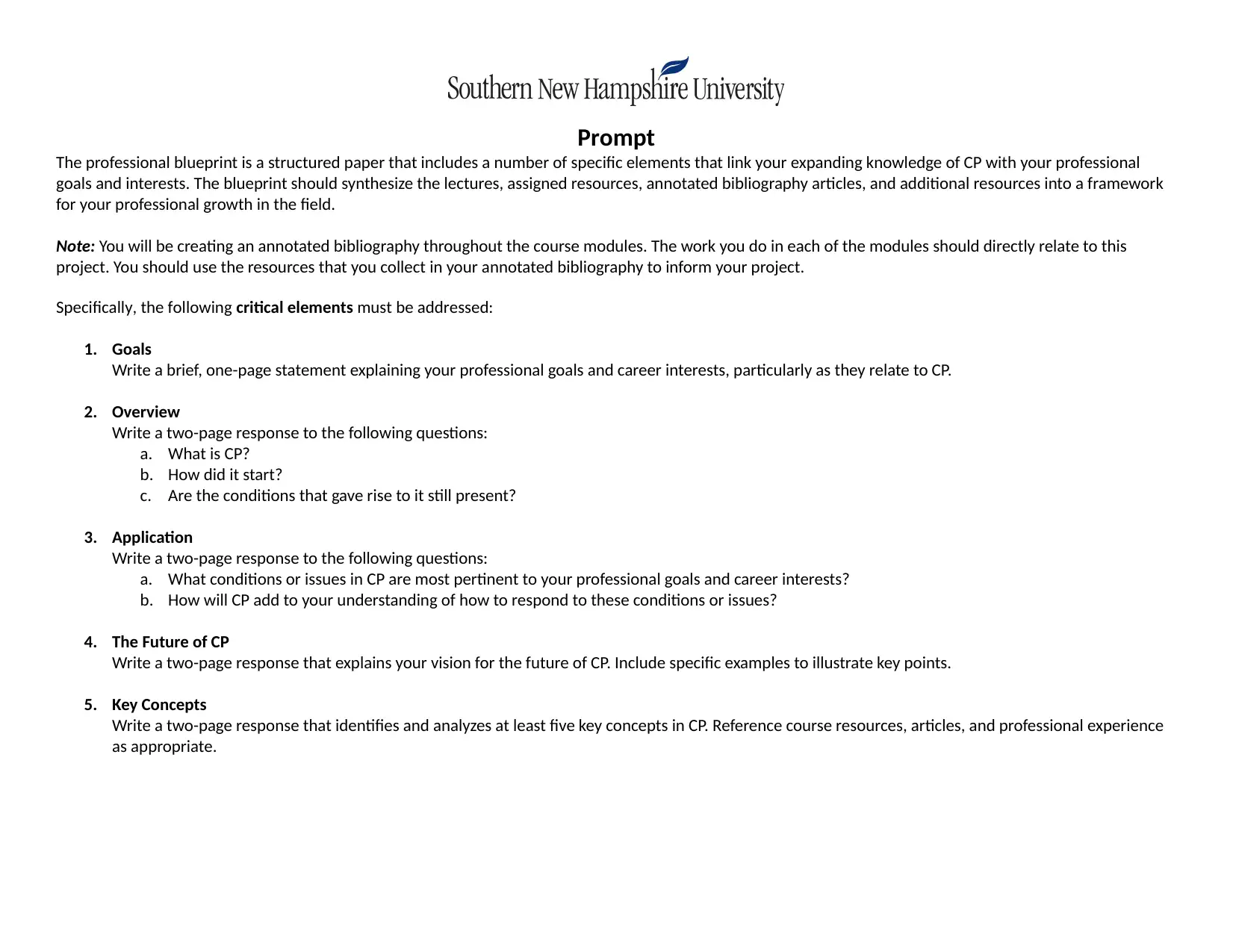
Prompt
The professional blueprint is a structured paper that includes a number of specific elements that link your expanding knowledge of CP with your professional
goals and interests. The blueprint should synthesize the lectures, assigned resources, annotated bibliography articles, and additional resources into a framework
for your professional growth in the field.
Note: You will be creating an annotated bibliography throughout the course modules. The work you do in each of the modules should directly relate to this
project. You should use the resources that you collect in your annotated bibliography to inform your project.
Specifically, the following critical elements must be addressed:
1. Goals
Write a brief, one-page statement explaining your professional goals and career interests, particularly as they relate to CP.
2. Overview
Write a two-page response to the following questions:
a. What is CP?
b. How did it start?
c. Are the conditions that gave rise to it still present?
3. Application
Write a two-page response to the following questions:
a. What conditions or issues in CP are most pertinent to your professional goals and career interests?
b. How will CP add to your understanding of how to respond to these conditions or issues?
4. The Future of CP
Write a two-page response that explains your vision for the future of CP. Include specific examples to illustrate key points.
5. Key Concepts
Write a two-page response that identifies and analyzes at least five key concepts in CP. Reference course resources, articles, and professional experience
as appropriate.
The professional blueprint is a structured paper that includes a number of specific elements that link your expanding knowledge of CP with your professional
goals and interests. The blueprint should synthesize the lectures, assigned resources, annotated bibliography articles, and additional resources into a framework
for your professional growth in the field.
Note: You will be creating an annotated bibliography throughout the course modules. The work you do in each of the modules should directly relate to this
project. You should use the resources that you collect in your annotated bibliography to inform your project.
Specifically, the following critical elements must be addressed:
1. Goals
Write a brief, one-page statement explaining your professional goals and career interests, particularly as they relate to CP.
2. Overview
Write a two-page response to the following questions:
a. What is CP?
b. How did it start?
c. Are the conditions that gave rise to it still present?
3. Application
Write a two-page response to the following questions:
a. What conditions or issues in CP are most pertinent to your professional goals and career interests?
b. How will CP add to your understanding of how to respond to these conditions or issues?
4. The Future of CP
Write a two-page response that explains your vision for the future of CP. Include specific examples to illustrate key points.
5. Key Concepts
Write a two-page response that identifies and analyzes at least five key concepts in CP. Reference course resources, articles, and professional experience
as appropriate.
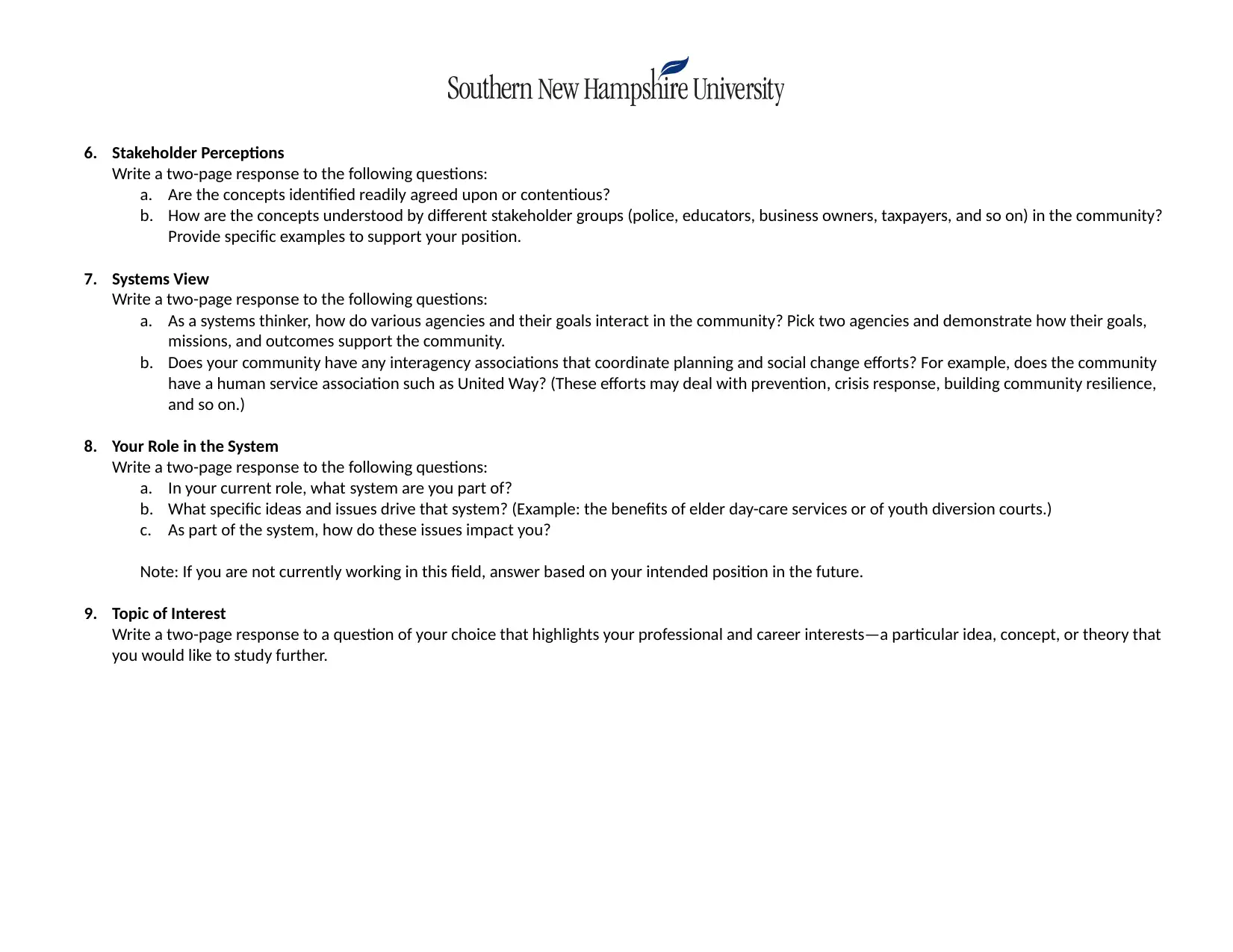
6. Stakeholder Perceptions
Write a two-page response to the following questions:
a. Are the concepts identified readily agreed upon or contentious?
b. How are the concepts understood by different stakeholder groups (police, educators, business owners, taxpayers, and so on) in the community?
Provide specific examples to support your position.
7. Systems View
Write a two-page response to the following questions:
a. As a systems thinker, how do various agencies and their goals interact in the community? Pick two agencies and demonstrate how their goals,
missions, and outcomes support the community.
b. Does your community have any interagency associations that coordinate planning and social change efforts? For example, does the community
have a human service association such as United Way? (These efforts may deal with prevention, crisis response, building community resilience,
and so on.)
8. Your Role in the System
Write a two-page response to the following questions:
a. In your current role, what system are you part of?
b. What specific ideas and issues drive that system? (Example: the benefits of elder day-care services or of youth diversion courts.)
c. As part of the system, how do these issues impact you?
Note: If you are not currently working in this field, answer based on your intended position in the future.
9. Topic of Interest
Write a two-page response to a question of your choice that highlights your professional and career interests—a particular idea, concept, or theory that
you would like to study further.
Write a two-page response to the following questions:
a. Are the concepts identified readily agreed upon or contentious?
b. How are the concepts understood by different stakeholder groups (police, educators, business owners, taxpayers, and so on) in the community?
Provide specific examples to support your position.
7. Systems View
Write a two-page response to the following questions:
a. As a systems thinker, how do various agencies and their goals interact in the community? Pick two agencies and demonstrate how their goals,
missions, and outcomes support the community.
b. Does your community have any interagency associations that coordinate planning and social change efforts? For example, does the community
have a human service association such as United Way? (These efforts may deal with prevention, crisis response, building community resilience,
and so on.)
8. Your Role in the System
Write a two-page response to the following questions:
a. In your current role, what system are you part of?
b. What specific ideas and issues drive that system? (Example: the benefits of elder day-care services or of youth diversion courts.)
c. As part of the system, how do these issues impact you?
Note: If you are not currently working in this field, answer based on your intended position in the future.
9. Topic of Interest
Write a two-page response to a question of your choice that highlights your professional and career interests—a particular idea, concept, or theory that
you would like to study further.
⊘ This is a preview!⊘
Do you want full access?
Subscribe today to unlock all pages.

Trusted by 1+ million students worldwide
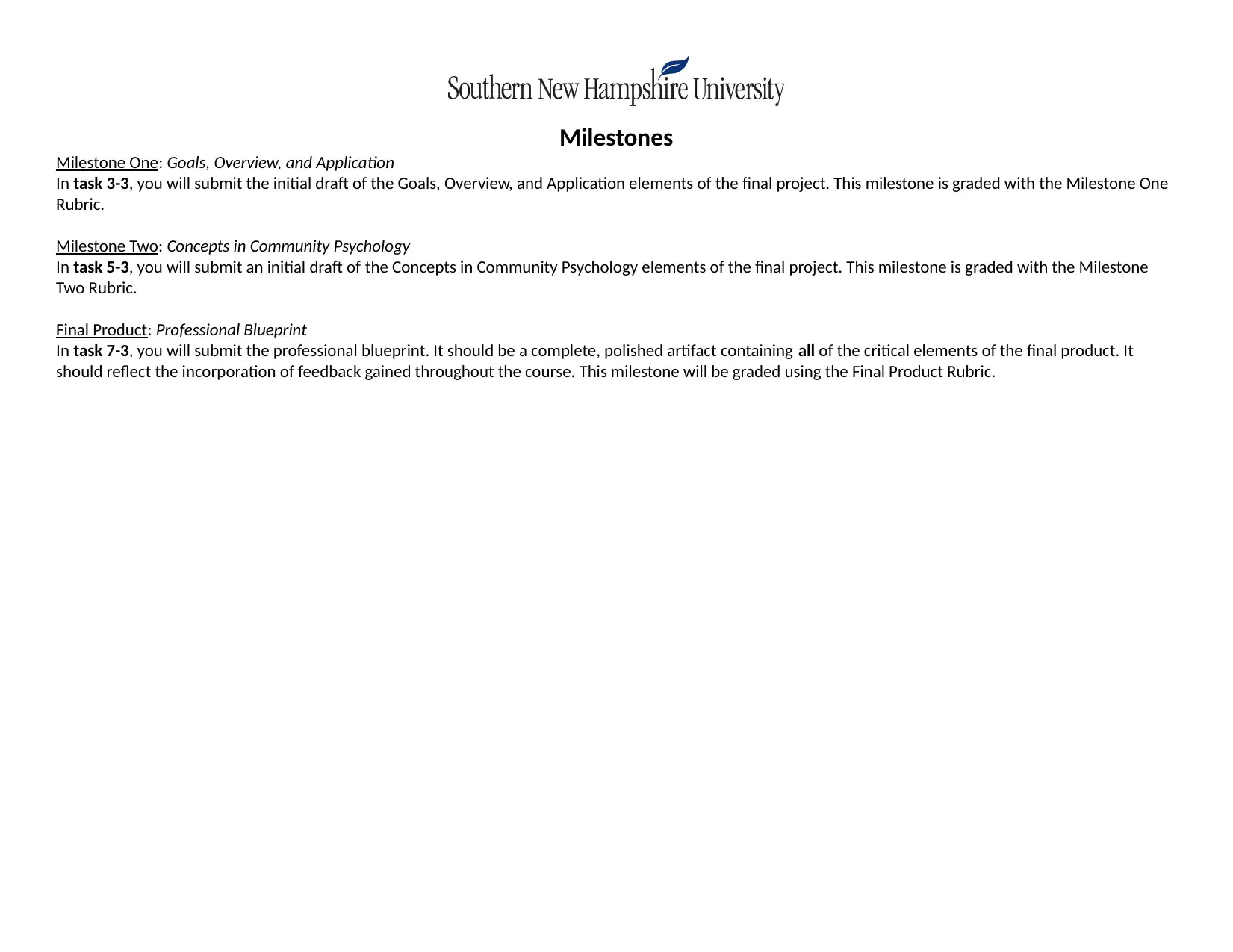
Milestones
Milestone One: Goals, Overview, and Application
In task 3-3, you will submit the initial draft of the Goals, Overview, and Application elements of the final project. This milestone is graded with the Milestone One
Rubric.
Milestone Two: Concepts in Community Psychology
In task 5-3, you will submit an initial draft of the Concepts in Community Psychology elements of the final project. This milestone is graded with the Milestone
Two Rubric.
Final Product: Professional Blueprint
In task 7-3, you will submit the professional blueprint. It should be a complete, polished artifact containing all of the critical elements of the final product. It
should reflect the incorporation of feedback gained throughout the course. This milestone will be graded using the Final Product Rubric.
Milestone One: Goals, Overview, and Application
In task 3-3, you will submit the initial draft of the Goals, Overview, and Application elements of the final project. This milestone is graded with the Milestone One
Rubric.
Milestone Two: Concepts in Community Psychology
In task 5-3, you will submit an initial draft of the Concepts in Community Psychology elements of the final project. This milestone is graded with the Milestone
Two Rubric.
Final Product: Professional Blueprint
In task 7-3, you will submit the professional blueprint. It should be a complete, polished artifact containing all of the critical elements of the final product. It
should reflect the incorporation of feedback gained throughout the course. This milestone will be graded using the Final Product Rubric.
Paraphrase This Document
Need a fresh take? Get an instant paraphrase of this document with our AI Paraphraser
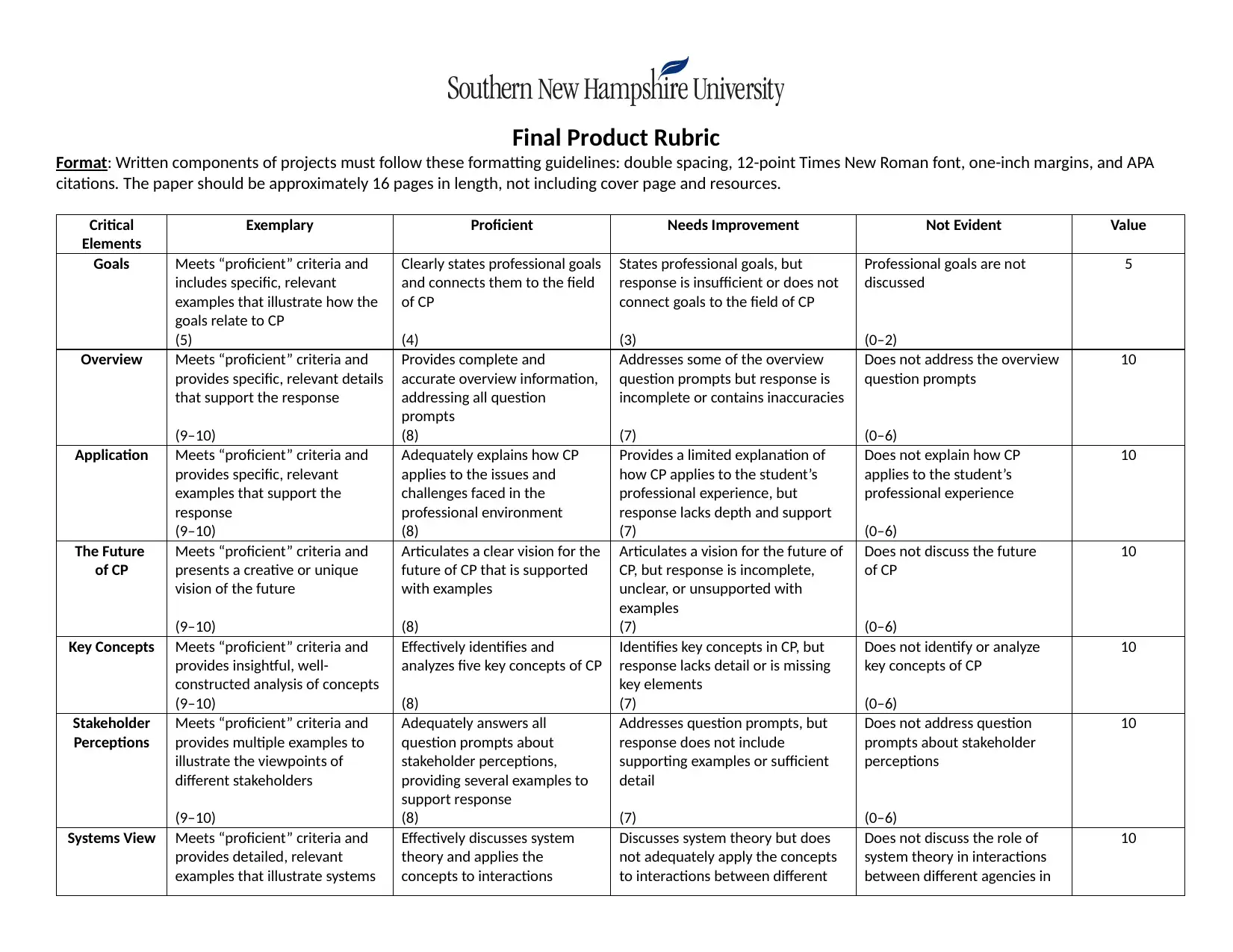
Final Product Rubric
Format: Written components of projects must follow these formatting guidelines: double spacing, 12-point Times New Roman font, one-inch margins, and APA
citations. The paper should be approximately 16 pages in length, not including cover page and resources.
Critical
Elements
Exemplary Proficient Needs Improvement Not Evident Value
Goals Meets “proficient” criteria and
includes specific, relevant
examples that illustrate how the
goals relate to CP
(5)
Clearly states professional goals
and connects them to the field
of CP
(4)
States professional goals, but
response is insufficient or does not
connect goals to the field of CP
(3)
Professional goals are not
discussed
(0–2)
5
Overview Meets “proficient” criteria and
provides specific, relevant details
that support the response
(9–10)
Provides complete and
accurate overview information,
addressing all question
prompts
(8)
Addresses some of the overview
question prompts but response is
incomplete or contains inaccuracies
(7)
Does not address the overview
question prompts
(0–6)
10
Application Meets “proficient” criteria and
provides specific, relevant
examples that support the
response
(9–10)
Adequately explains how CP
applies to the issues and
challenges faced in the
professional environment
(8)
Provides a limited explanation of
how CP applies to the student’s
professional experience, but
response lacks depth and support
(7)
Does not explain how CP
applies to the student’s
professional experience
(0–6)
10
The Future
of CP
Meets “proficient” criteria and
presents a creative or unique
vision of the future
(9–10)
Articulates a clear vision for the
future of CP that is supported
with examples
(8)
Articulates a vision for the future of
CP, but response is incomplete,
unclear, or unsupported with
examples
(7)
Does not discuss the future
of CP
(0–6)
10
Key Concepts Meets “proficient” criteria and
provides insightful, well-
constructed analysis of concepts
(9–10)
Effectively identifies and
analyzes five key concepts of CP
(8)
Identifies key concepts in CP, but
response lacks detail or is missing
key elements
(7)
Does not identify or analyze
key concepts of CP
(0–6)
10
Stakeholder
Perceptions
Meets “proficient” criteria and
provides multiple examples to
illustrate the viewpoints of
different stakeholders
(9–10)
Adequately answers all
question prompts about
stakeholder perceptions,
providing several examples to
support response
(8)
Addresses question prompts, but
response does not include
supporting examples or sufficient
detail
(7)
Does not address question
prompts about stakeholder
perceptions
(0–6)
10
Systems View Meets “proficient” criteria and
provides detailed, relevant
examples that illustrate systems
Effectively discusses system
theory and applies the
concepts to interactions
Discusses system theory but does
not adequately apply the concepts
to interactions between different
Does not discuss the role of
system theory in interactions
between different agencies in
10
Format: Written components of projects must follow these formatting guidelines: double spacing, 12-point Times New Roman font, one-inch margins, and APA
citations. The paper should be approximately 16 pages in length, not including cover page and resources.
Critical
Elements
Exemplary Proficient Needs Improvement Not Evident Value
Goals Meets “proficient” criteria and
includes specific, relevant
examples that illustrate how the
goals relate to CP
(5)
Clearly states professional goals
and connects them to the field
of CP
(4)
States professional goals, but
response is insufficient or does not
connect goals to the field of CP
(3)
Professional goals are not
discussed
(0–2)
5
Overview Meets “proficient” criteria and
provides specific, relevant details
that support the response
(9–10)
Provides complete and
accurate overview information,
addressing all question
prompts
(8)
Addresses some of the overview
question prompts but response is
incomplete or contains inaccuracies
(7)
Does not address the overview
question prompts
(0–6)
10
Application Meets “proficient” criteria and
provides specific, relevant
examples that support the
response
(9–10)
Adequately explains how CP
applies to the issues and
challenges faced in the
professional environment
(8)
Provides a limited explanation of
how CP applies to the student’s
professional experience, but
response lacks depth and support
(7)
Does not explain how CP
applies to the student’s
professional experience
(0–6)
10
The Future
of CP
Meets “proficient” criteria and
presents a creative or unique
vision of the future
(9–10)
Articulates a clear vision for the
future of CP that is supported
with examples
(8)
Articulates a vision for the future of
CP, but response is incomplete,
unclear, or unsupported with
examples
(7)
Does not discuss the future
of CP
(0–6)
10
Key Concepts Meets “proficient” criteria and
provides insightful, well-
constructed analysis of concepts
(9–10)
Effectively identifies and
analyzes five key concepts of CP
(8)
Identifies key concepts in CP, but
response lacks detail or is missing
key elements
(7)
Does not identify or analyze
key concepts of CP
(0–6)
10
Stakeholder
Perceptions
Meets “proficient” criteria and
provides multiple examples to
illustrate the viewpoints of
different stakeholders
(9–10)
Adequately answers all
question prompts about
stakeholder perceptions,
providing several examples to
support response
(8)
Addresses question prompts, but
response does not include
supporting examples or sufficient
detail
(7)
Does not address question
prompts about stakeholder
perceptions
(0–6)
10
Systems View Meets “proficient” criteria and
provides detailed, relevant
examples that illustrate systems
Effectively discusses system
theory and applies the
concepts to interactions
Discusses system theory but does
not adequately apply the concepts
to interactions between different
Does not discuss the role of
system theory in interactions
between different agencies in
10
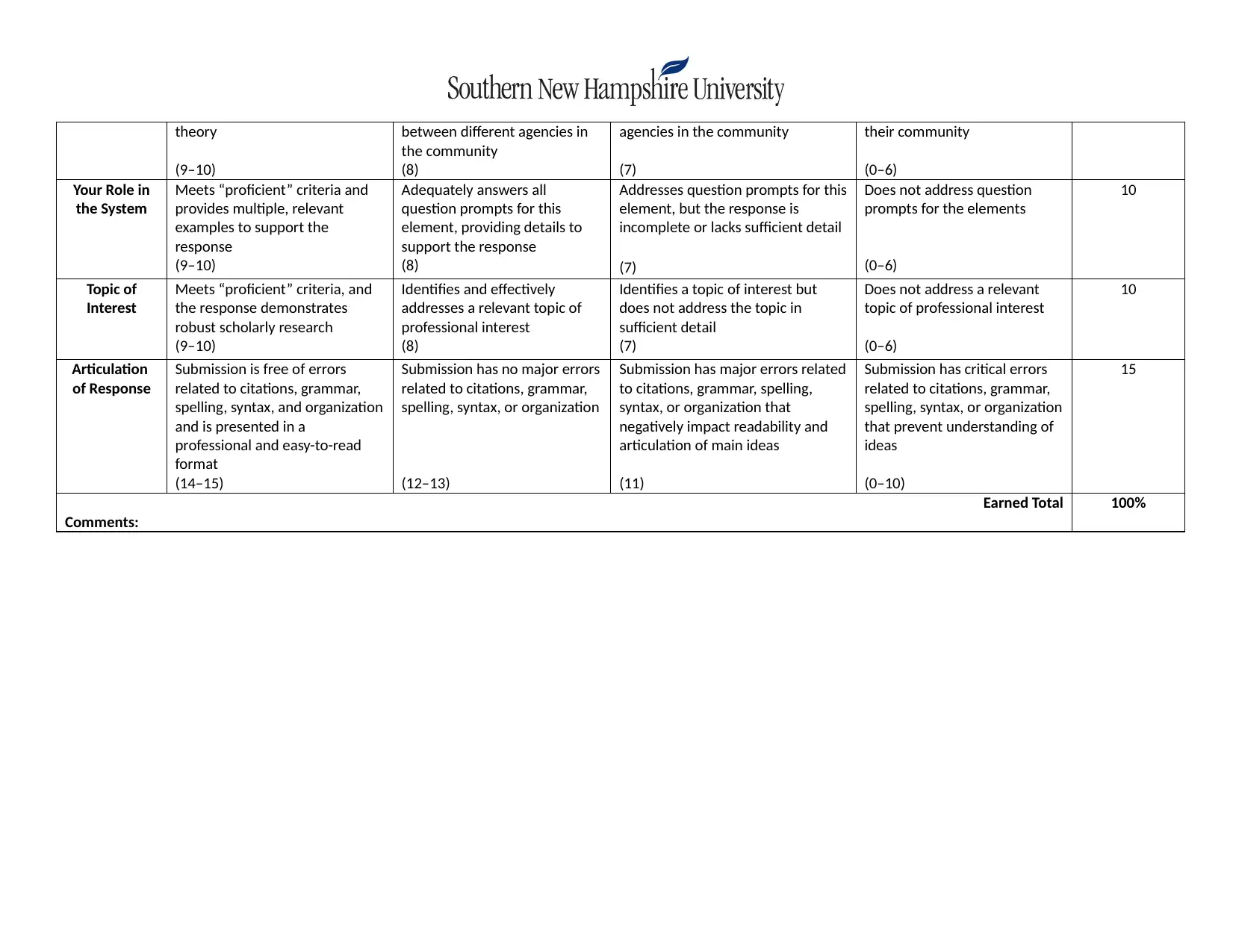
theory
(9–10)
between different agencies in
the community
(8)
agencies in the community
(7)
their community
(0–6)
Your Role in
the System
Meets “proficient” criteria and
provides multiple, relevant
examples to support the
response
(9–10)
Adequately answers all
question prompts for this
element, providing details to
support the response
(8)
Addresses question prompts for this
element, but the response is
incomplete or lacks sufficient detail
(7)
Does not address question
prompts for the elements
(0–6)
10
Topic of
Interest
Meets “proficient” criteria, and
the response demonstrates
robust scholarly research
(9–10)
Identifies and effectively
addresses a relevant topic of
professional interest
(8)
Identifies a topic of interest but
does not address the topic in
sufficient detail
(7)
Does not address a relevant
topic of professional interest
(0–6)
10
Articulation
of Response
Submission is free of errors
related to citations, grammar,
spelling, syntax, and organization
and is presented in a
professional and easy-to-read
format
(14–15)
Submission has no major errors
related to citations, grammar,
spelling, syntax, or organization
(12–13)
Submission has major errors related
to citations, grammar, spelling,
syntax, or organization that
negatively impact readability and
articulation of main ideas
(11)
Submission has critical errors
related to citations, grammar,
spelling, syntax, or organization
that prevent understanding of
ideas
(0–10)
15
Earned Total
Comments:
100%
(9–10)
between different agencies in
the community
(8)
agencies in the community
(7)
their community
(0–6)
Your Role in
the System
Meets “proficient” criteria and
provides multiple, relevant
examples to support the
response
(9–10)
Adequately answers all
question prompts for this
element, providing details to
support the response
(8)
Addresses question prompts for this
element, but the response is
incomplete or lacks sufficient detail
(7)
Does not address question
prompts for the elements
(0–6)
10
Topic of
Interest
Meets “proficient” criteria, and
the response demonstrates
robust scholarly research
(9–10)
Identifies and effectively
addresses a relevant topic of
professional interest
(8)
Identifies a topic of interest but
does not address the topic in
sufficient detail
(7)
Does not address a relevant
topic of professional interest
(0–6)
10
Articulation
of Response
Submission is free of errors
related to citations, grammar,
spelling, syntax, and organization
and is presented in a
professional and easy-to-read
format
(14–15)
Submission has no major errors
related to citations, grammar,
spelling, syntax, or organization
(12–13)
Submission has major errors related
to citations, grammar, spelling,
syntax, or organization that
negatively impact readability and
articulation of main ideas
(11)
Submission has critical errors
related to citations, grammar,
spelling, syntax, or organization
that prevent understanding of
ideas
(0–10)
15
Earned Total
Comments:
100%
⊘ This is a preview!⊘
Do you want full access?
Subscribe today to unlock all pages.

Trusted by 1+ million students worldwide
1 out of 6
Related Documents
Your All-in-One AI-Powered Toolkit for Academic Success.
+13062052269
info@desklib.com
Available 24*7 on WhatsApp / Email
![[object Object]](/_next/static/media/star-bottom.7253800d.svg)
Unlock your academic potential
Copyright © 2020–2025 A2Z Services. All Rights Reserved. Developed and managed by ZUCOL.





